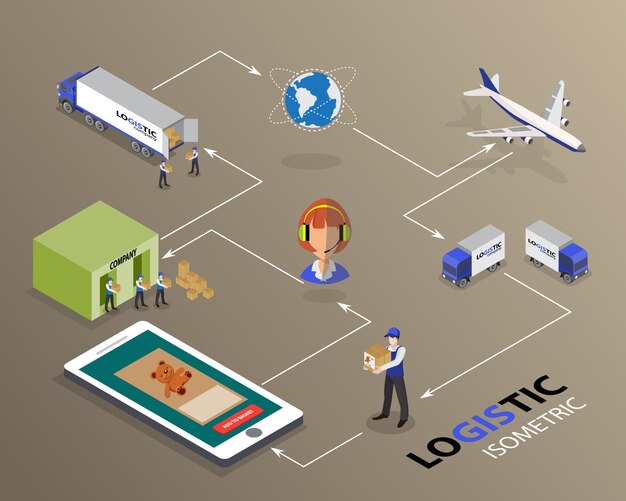
Table of Contents
Tracking the air freight cargo is hard to find. The possibilities for the proper management of air cargo are infinite. There is a striking discovery of professional looking new ideas in shipping any air cargo.
While previously, only the tracking number was recorded for a package during its shipping period, now the same package can be tracked during its manufacturing and packaging phases as well as the shipping phase.
The number of packages that had been flagged for urgent red-eye shipment that sometimes missed Time allowance of goods moving to and from locations was wired up to be more helpful in concocting better tactics to traffic the specific air freight.
On the other hand, those who used such processes as GPS, RFID and even computerized application software that are not appended with these technologies are now things of the past.
Constant edited tracking of how much asset of any parcel is utilized upon shipment by various companies engaged in airfreight shipping aids in enhancing the efficiency of the shipping operations.
It has emerged from the analysis that the system of tracking air freight cargo has a measurable influence on logistics systems management.
Such companies are likely to improve their supply chains, successfully meet deadlines and retain their market share as regards their shipments due to better tracking of deliveries, time and efficiency.
The usefulness of such systems will increase with time because the pressure on logistics activities will increase even.
What Are The Merits Of Embracing Such Tracking Systems As Logistics Operations Management Improvement?

Logistics management is the planning, executing, and controlling of the movement of goods and related resource activities, including supervising the information accompanying the goods.
This component, where tracking of air freights is included, is considered one of the most important aspects in the current logistics management since such systems lead to improved supply chains that will meet the desires of the end users.
This paper explains how logistic managers can monitor the exact location and status of the loads through the latest innovations in logistics tracking systems, including GPS and Radio Frequency Identification systems.
This aspect helps in utilizing the other advantages in preventing such damage in good time so that there is no time wastage and the most favorable paths are utilized.
Moreover, the air freight shipments and their cargo tracking systems inspire better interaction between all sides – the suppliers, the carriers and the customers.
Because all members can be informed as to the status of the shipment, any business ventures into real-time information on the shipment, thereby enabling the business to rise since cooperation is strengthened.
Provided the tracking system, the logistics division can now move a notch higher than mere tracking systems by understanding the trends and gaps.
For instance, looking at transit times, delays, shipment patterns and other parameters can lead to positive changes in a business, enhancing the performance and customer satisfaction with well-organized logistics systems.
All in all, it cannot be denied that air freight cargo tracking is important since it brings a solution to every hurdle that arises in capturing all cargo movements.
What Advantages Are Gained By Tracking Air Cargo Shipments To Customer Needs?

Regarding customer satisfaction, clarity and embellishment are attributes that air freight cargo tracking systems boost. For example, they can get information such as where their cargo is right now, its status when it will arrive and things of that nature.
This visibility is even more critical for those industries that are exceptionally time-pressured in terms of forcible shipments for production or for the orders placed.
Likewise, the ability to track the order prevents the customers’ apprehension since customers can monitor the progress and be informed about any evident changes in the scheduled delivery.
Such communication instills trust and further cements the transport organization’s relationship with clients.
No one has to become annoyed when there is a delay or any other problem because the business can call the clients and explain what is happening.
Also, these systems, as the one which helps to track the parcel, assist in delivering better solutions, and produce information that can assist in bettering the situation.
They can view their metrics, observe what stands out, what is done repeatedly, and what actions must be taken for their logistics systems to experience optimization.
This continual improvement will result not only in better service delivery but also in improved customer loyalty.
Finally, effective air freight cargo tracking processes satisfy the customers. In turn, it makes customers ready to request the same service again for the next consignment.
In what ways has the tracking of air freight cargo enhanced its overall system of cost savings?

The air freight cargo tracking system helps minimize the operational costs in the supply chain by improving business operations and minimizing the chances of losses.
This helps organizations prevent severe concerns due to operational disruption or complications such as delay, loss of items in transit and loss of goods.
In this way, avoiding unnecessary costs arising from lost consignment, additional shipments, changing freight routes and even fines becomes possible.
Moreover, this information about these tracking systems and the vast amounts of data that goes with it, allows companies to be more innovative in their logistics operations.
Once more, monitoring systems facilitate the management of customer relations and work management with suppliers and carriers throughout the supply chain.
The net gains from the decreased errors translate to better management of the whole chain. Last but not least, air freight cargo tracking systems allow organizations to increase their efficiency, decrease waste of time, all translating to improving their financial performance.
Which Problems Can Be Solved with Air Cargo Tracking?

Operating mechanisms from the management have also detailed the materials brought about by the aeromodels.
The material components allocated to an aero model are partially utilized from an economic perspective and partially in a passive sense.
For example, some staff have come to the office and have some work assigned for the day. An employee would not be able to manage his task of deliverables and could end up going to work without the means to do any of the required work.
It is, therefore, imperative to solve these challenges to avoid incurring high costs associated with the loss of parcels, changing addresses for the parcels, and additional costs due to penalty fees.
As an added value, effective tracking data is also used by companies to enhance their cargo logistics. More information, firms seek to streamline not only the routing of the shipments but also the time for the actual transportation of the products by assessing trends in their shipments.
The optimization, however, reduces fuel and transportation costs and lowers inventory carrying costs because products are delivered to the market in good time and proper condition.
In addition, efficient tracking systems improve the communication between groups of people such as suppliers, carriers and their customers, including their communication and relations.
Their better communication and good relations helped eradicate mistakes and improve supply chains.
In twin ways, it has become possible for the organizations not to incur unnecessary bureaucracies and delays in air freight, yet ensure proper planning and management of air cargo.
Secondly, firms have been enabled to pick effective strategies backed with relevant information, making the firm minimize costs and enhance its productive outputs.
How Does Air Freight Cargo Tracking Influence Logistics Management?

Logistics decision-making is affected by the air freight cargo tracking feature by providing useful information at the right time.
The availability of economic information regarding the tracking of the goods in transport also assists the logician throughout the cargo cycle in identifying its position.
Because of this, not only the performance of the simultaneous users can be evaluated, but their location or case subjects, too, on a dynamic basis.
As such, they can anticipate and counteract the likelihood of occurrences and exercise management in case unforeseen incidents occur.
This could, for example, be prohibiting the movement of specific high-priority marine freight orders or extending a given delivery period.
Also, resource allocation in tracking data is made possible as the logistics managers understand the extent of the shipment in how many people, how big a storage area and how much transportation resources are appropriate.
Such resource Allocation aids in achieving the effectiveness of the performance level without incurring excessive resource use.
This information can further assist even towards more targeted patterns and trends, enhancing better logistics practices for a company and its performance.
Also, air freight cargo tracking gave additional chances to cooperate with the supply chain members, such as suppliers, transporters or customers.
The real time data exchange reinforces the cooperation and trust in business relations, which are extremely important in maintaining a robust relation with all relevant contributors.
Finally, air freight cargo tracking helps devise and make quick decisions, leading to quick response times, effective operational processes and meeting customer requirements concerning logistics.
FAQ’s
Q: How to track cargo shipments?
To track a cargo shipment effectively, you have to refer to the website or application of the carrier and use a tracking number to inquire about the present whereabouts or position of the cargo.
Q: How to track cargo shipments?
To track your cargo shipment, enter the tracking number you received from the shipping carrier into any shipping carrier carriers es or mobile apps below to see tracking updates.
Q: What do you mean by air freight Cargo tracking?
Air cargo trace or air freight tracking is defined as the continuous tracking and monitoring of the movement of a piece of air cargo concerning the different status messages relating to the present movement status, the location and expected delivery time.
Q: Are you able to monitor the location of a cargo flight?
Yes, anyone can do that. You can track a cargo flight by looking it up online using the flight number listed in the respective real flight status detail applications or websites.
Conclusion
These tracking technologies improve the management of strategic air freight distributions in air freight cargo tracking.
Such enhancement will improve the overall logistics management through increased visibility, reduced expenditures, and higher effectiveness in supply chain management. The importance of the freight will, however, only expand with servicing the new changes in activities.

